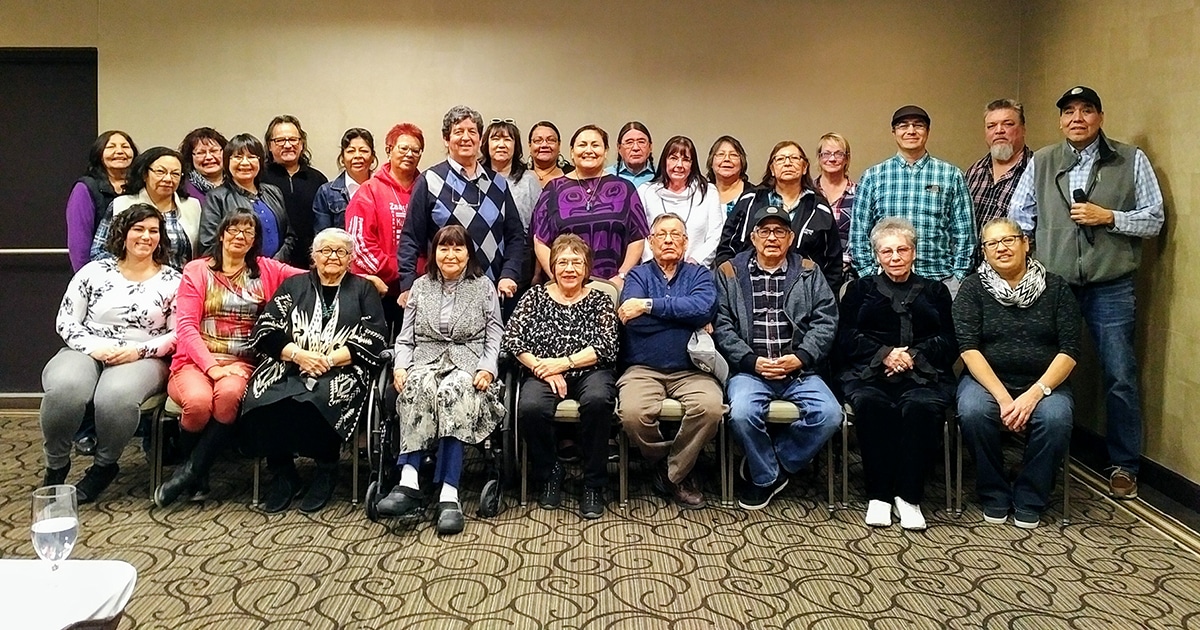The long journey towards healing and reconciliation can be even more arduous for residential school survivors living in remote northern communities.
Where survivors in urban centres can more easily find information, resources and support online, or by travelling to their local friendship centre or band office, such options do not always exist for survivors in northern and rural areas, where computer access and high-speed Internet is often limited or lacking.
Responding to a call from Health Canada for a project to provide emotional support to survivors, Ontario Indian Residential School Support Services (OIRSSS) earlier this summer organized “Reconciliation Begins With Me”, a series of workshops that took place from June 13-30 in communities that included Sault Ste. Marie, Fort Albany, Moose Factory, Moosonee, Attawapiskat, Peawanuck, and Kashechewan.
The Anglican Healing Fund provided a $15,000 grant to OIRSSS in support of the workshops—a continuation of the annual grants that the Fund has donated for more than a decade to OIRSSS, formerly known as the Children of Shingwauk Alumni Association.
“We really appreciate what the Anglican Church has done,” said special projects resolution health support worker/cultural support worker Claudette Chevrier, who helped coordinate the workshops. “We’re really, very, very appreciative of the small amount of funds that are set aside specifically for healing, and our view is to try to reach out to as many survivors as we can so that we can come to that place of healing.”
She added, “We want everyone to be educated with the correct version of what happened throughout the years [in the residential schools], and how to equip them with the knowledge and understanding that as long as we’re alive … it’s never going to happen again.”
Resolution health support workers Andrew Reuben and June Black facilitated the workshops, which brought together approximately 90 participants in total, including residential school survivors, elders, and intergenerational school survivors.
Each workshop lasted between two and three hours, beginning with a traditional smudging ceremony. Most of the sessions were held in Cree, the native language of many participants, with English used as a secondary language.
The meaning of reconciliation
Sitting in a circle, participants introduced themselves, shared their stories related to the residential school experience, and what reconciliation meant to them.
“All of the workshops, of course, were difficult,” said Reuben, himself a residential school survivor. “There were still strong feelings about not forgiving and really having a hard time trying to deal with their own issues even today, after the [Truth and Reconciliation Commission] hearings and after sharing their stuff.”
Many survivors described feeling as if they had been unable to describe everything they wanted to talk about at the hearings. Some pointed to difficulty in being able to share their experiences even with their own children, who are often worried that asking about their parents’ residential school experiences will dredge up painful memories.
The meaning of reconciliation was itself the subject of debate at the workshops. Reuben described a common sentiment among survivors: “Why should we reconcile [when] we didn’t do anything? … The people who did the wrong should be reconciling—to not only us, but our parents, our grandparents, all our relations.” Some participants, he added, even used the sardonic term “wreck-onciliation”—as in, “they wrecked everything”.
Yet many also described reconciliation as entailing forgiveness, and wanting to move forward with a positive goal in mind. In this respect, one goal stood out above all others: the recovery and revitalization of Indigenous languages.
“If we can utilize our language more, speak our language more, share in our language more, that brings back our identity,” Reuben said. “It brings back the things that our parents and our grandparents talked about way before the residential schools … about importance of identity, importance of man and woman, importance of sharing and helping in the community, and all those things that [Indigenous] people utilized” prior to colonization.
Call for a gathering of survivors
The most common need expressed by participants was for a conference or gathering that would bring together all survivors from the Mushkegowuk area of northern Ontario to talk about the future, get youth involved, and talk about how to move forward with reconciliation.
Though OIRSSS is currently analyzing feedback from the workshops, they plan to eventually organize more visits or the suggested gathering.
“I think all in all, people found it useful to share a little bit and ask about what’s possible in the future, and continue to try and move on with their lives and talk to their children and share with their children,” Reuben said.
“There’s still a long way to go, still a lot of issues I think they have that they need to consider and heal from themselves … The gathering would help, I think, a lot more in getting the word out that we need to all work together to heal ourselves.”
Interested in keeping up-to-date on news, opinion, events and resources from the Anglican Church of Canada? Sign up for our email alerts .

